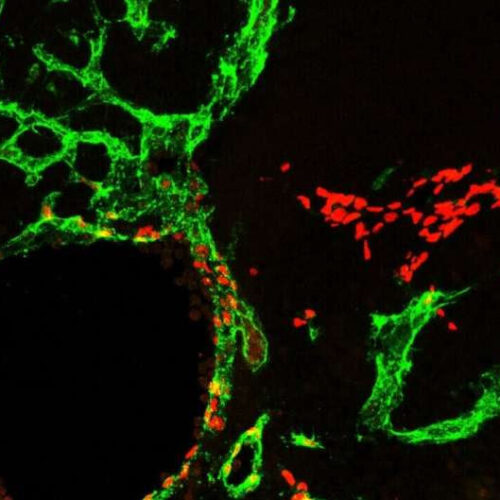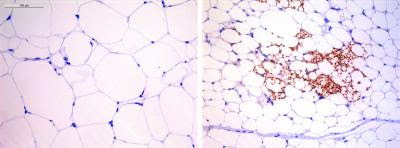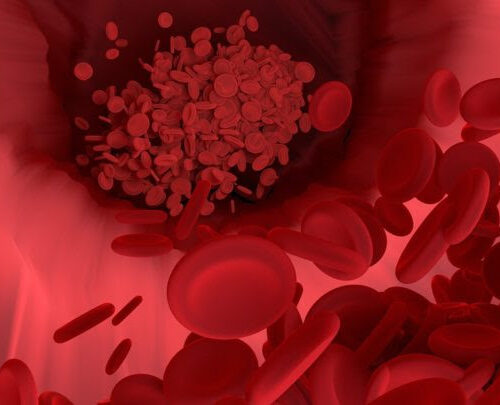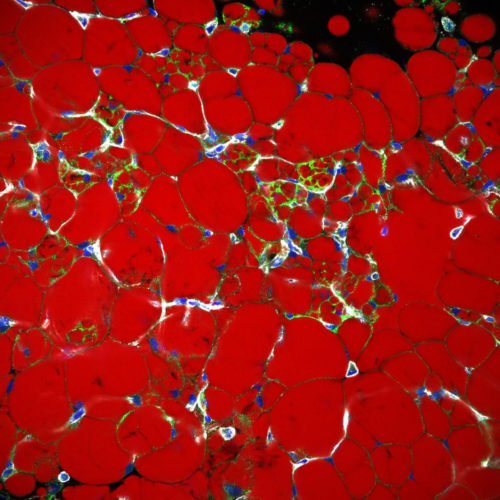by Northwestern University Formation of lymphatic endothelial progenitor cells (red) in the cardinal vein (CV) and the budding of those lymphatic progenitors outside the vein to reach different organs and tissues and form the entire lymphatic vasculature. CV and blood vasculature are labeled in green. Credit: Northwestern University Mitochondria play a key role in the formation...
Category: <span>Metabolic</span>
CNIO researchers discover that a drug already in use in humans corrects obesity in mice
CENTRO NACIONAL DE INVESTIGACIONES ONCOLÓGICAS (CNIO) IMAGE: VISUALIZATION OF ADIPOCYTES FROM AN OBESE MOUSE (LEFT) AND FROM A LEAN MOUSE TREATED WITH DIGOXIN (RIGHT), SHOWING A BETTER RESPONSE TO NUTRIENT EXCESS AND BURNING OF FAT. CREDIT: CNIO It has long been known that obesity is an inflammatory disease, i.e. a chronic defensive reaction of the...
PPARα Slows Atherosclerosis by Inhibiting Vascular Cellular Senescence
It may turn out to be the case that many mechanisms of cellular regulation that slow aspects of aging function, at least in part, by slowing the pace at which senescent cells accumulate. Senescent cells induce tissue dysfunction via inflammatory signaling. Studies in which senescent cells are selectively destroyed in old tissues via senolytic drugs have resulted in...
New approach for the development of a drug treatment for obesity and the resulting diseases
DEUTSCHES ZENTRUM FUER DIABETESFORSCHUNG DZD IMAGE: BEIGE ADIPOCYTES WITHIN WHITE ADIPOSE TISSUE (BEIGE ADIPOCYTES STAINED WITH UCP-1 IN GREEN. LIPIDS ARE STAINED IN RED AND F-ACTIN OUTLINING CELLS ESPECIALLY BLOOD VESSELS IN GREY, DNA IST BLUE). CREDIT: RUTH KARLINA The protein Asc-1 regulates whether fat-burning beige or fat-storing white adipocytes are formed, which can have...
Researchers identify a way to reverse high blood sugar and muscle loss
by Monash University Credit: CC0 Public Domain A study by Monash University has uncovered that liver metabolism is disrupted in people with obesity-related type 2 diabetes, which contributes to high blood sugar and muscle loss—also known as skeletal muscle atrophy. Using human trials as well as mouse models, collaborative research led by Dr. Adam Rose at...
Metabolic derangements caused by a high-fat diet may be possible to eliminate
Intake of a high-fat diet leads to an increased risk for obesity, type 2 diabetes, cardiovascular diseases and fatty liver. A study in mice from Karolinska Institutet shows that it is possible to eliminate the deleterious effects of a high-fat diet by lowering the levels of apolipoprotein CIII (apoCIII), a key regulator of lipid metabolism....
Metabolic derangements caused by a high-fat diet may be possible to eliminate
by Karolinska Institutet Credit: Unsplash/CC0 Public Domain Intake of a high-fat diet leads to an increased risk for obesity, type 2 diabetes, cardiovascular diseases and fatty liver. A study in mice from Karolinska Institutet in Sweden shows that it is possible to eliminate the deleterious effects of a high-fat diet by lowering the levels of apolipoprotein...
High-fat diets can cause normal liver tissue to behave like tumor tissue
by VIB (the Flanders Institute for Biotechnology) Credit: Unsplash/CC0 Public Domain Normal, non-cancerous liver tissue can act like tumor tissue when exposed to a diet high in fat, linking diet and obesity to the development of liver cancer. The Laboratory of Cellular Metabolism and Metabolic Regulation headed by Prof. Sarah-Maria Fendt (VIB-KU Leuven Center for Cancer...
Weight loss drug hope for patients with type 2 diabetes
by University of Leicester Credit: Unsplash/CC0 Public Domain Patients with type 2 diabetes that were treated with a weekly injection of the breakthrough drug Semaglutide were able to achieve an average weight loss of nearly 10 kg, according to a new study published in The Lancet today. Led by Melanie Davies, Professor of Diabetes Medicine at...
Store Fat or Burn It? Targeting a Single Protein Flips the Switch
As obesity becomes a growing issue worldwide – nearly tripling over the last-half century – scientists are trying to gain a better understanding of the condition at the molecular level. Now, new research led by UC San Francisco scientists suggests that a single protein could play an outsized role in weight gain. As reported in Nature Metabolism, UCSF’s Davide...










